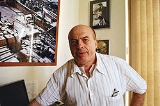
and prisoner, Israel
i politician, human rights activist and author.
Anatoly Borisovich Shcharansky (later Natan Sharansky) was born in Stalino, Soviet Union
on 20 January 1948 to a Jewish family.
A lack of moral clarity is also the tragedy that has befallen efforts to advance peace and security in the world. Promoting peace and security is fundamentally connected to promoting freedom and democracy. ![]()
The conviction that freedom is a universal desire is not the property of any political camp. ... Yet those who hold it remain a precious few, outnumbered many times over by the skeptics who don't.![]()
A simple way to determine whether the right to dissent in a particular society is being upheld is to apply the Town square test|town square test: Can a person walk into the middle of the town square and express his or her views without fear of arrest, imprisonment, or physical harm? If he can, then that person is living in a free society. If not, it's a fear society.![]()
Now we can see why nondemocratic regimes imperil the security of the world. They stay in power by controlling their populations. This control invariably requires an increasing amount of repression. To justify this repression and maintain internal stability, external enemies must be manufactured.![]()
Freedom's skeptics must understand that the democracy that hates you is less dangerous than the dictator who loves you. Indeed, it is the absence of democracy that represents the real threat to peace.![]()

